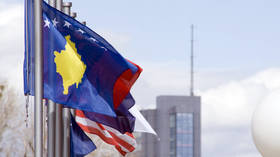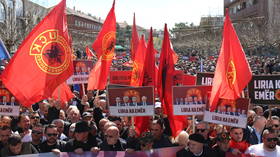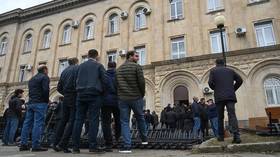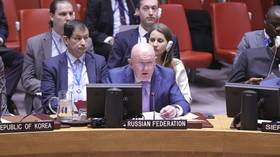EU visa deal for Kosovo discriminates against Serbs – Belgrade

The EU's approval of a visa-free regime for Kosovo residents discriminates against almost 100,000 people, whose documents the ethnic Albanian government in Pristina refuses to recognize, a high-ranking member of the Serbian parliament has claimed.
“This is unprecedented discrimination,” Aleksandar Markovic, chair of the Serbian parliament’s defense and internal affairs committee, told RT Balkans on Thursday. “This is punishing ethnic Serbs for being Serbs and having Serbian documents,” adding that the decision violates international agreements.
Markovic called the new EU policy “direct pressure on Serbs to renounce our documents, which is unheard of,” and described it as “continued policy of double standards” by certain members of the international community.
On Tuesday, the European Parliament formally approved the arrangement, proposed by the European Commission in March, under which residents of Kosovo would be allowed to visit the EU for 90 days without a visa. The measure was signed into law on Wednesday, and is scheduled to go into effect by January 1, 2024.
Dutch MEP Thijs Reuten, the EP’s rapporteur on Kosovo, said that “this milestone is also an important foundation for the future and ever-closer cooperation between the EU and Kosovo.” The breakaway province formally applied for membership last December, even though five members of the bloc do not recognize its independence.
When the EU granted Serbia visa-free travel in 2009, it exempted the breakaway province, whose provisional government had declared independence the year prior. A special office in Belgrade continued to issue Serbian passports to both Serbs and Albanians living in Kosovo. The ethnic Albanian government in Pristina has refused to recognize the documents, although it committed to doing so in the 2013 Brussels Agreement.
The EU does not recognize these passports either, forcing some 90,000 holders of such documents to obtain a special visa. Meanwhile, many ethnic Albanians from Kosovo had obtained Serbian passports in order to get visa-free access to the EU.
“The EU is sending Kosovo Serbs an expectedly vile message: You may be ethnic Serbs, but you must accept being citizens of ‘independent’ Kosovo,” political analyst Dejan Vuk Stankovic told RT Balkans.
Stankovic described the visa deal as symbolic support from Brussels to Kosovo’s independence. He also said it might have the opposite effect in practice, making it easier for young ethnic Albanians to leave the breakaway province for economic reasons.
The EU has made recognition of Kosovo a de facto condition of Serbia’s EU membership. President Aleksandar Vucic insists that Belgrade remains committed to joining the bloc, but that he will also never recognize the breakaway province.













